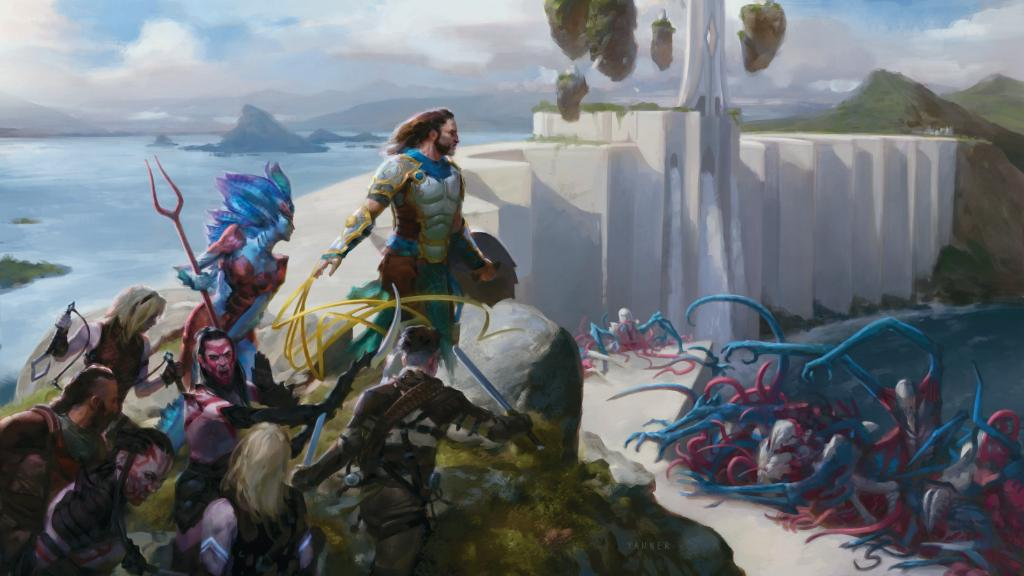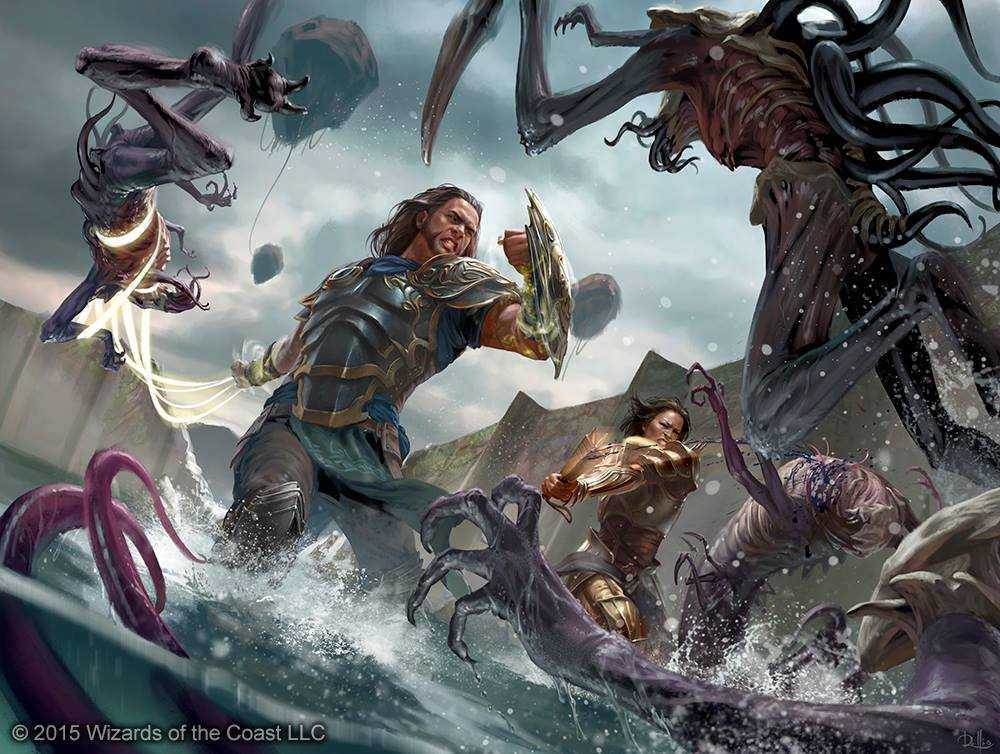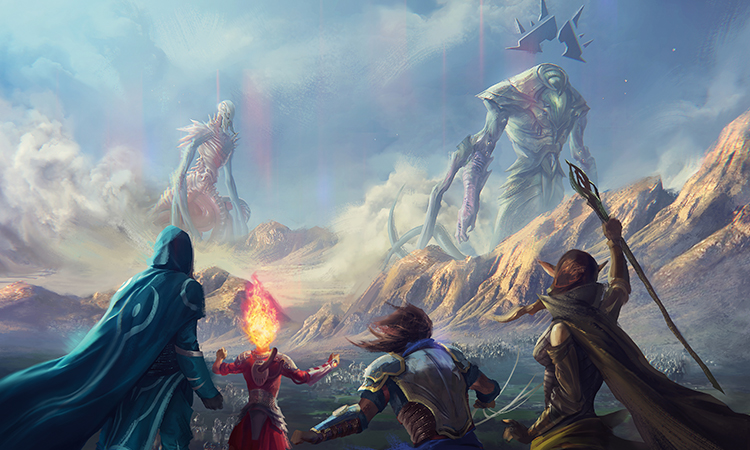This is part three in our series exploring the life of Gideon Jura. Part one. Part two.
The plane of Zendikar is falling, but it’s not gone yet. Heroes are coming to its aid from all over the Multiverse. And though their purpose is one, they need leadership. Gideon Jura will rise to the occasion and gather all the disparate defenders together under one banner. In doing so, he will both save the plane and establish an order of cosmic guardians, who will become the family he never thought to regain.
A mostly-dead Gideon accosts Jace Beleren at a nice restaurant on Ravnica and drafts him into the war effort. Though this is the first time they’ve met, Jace’s foresight and love of planning immediately proves to be a good influence on Gideon. Gideon wants to leave immediately, but Jace forces him to slow up and see a healer. He begrudgingly assents, but will later be thankful for the delay:
As much as he hated to admit it, if Jace had not dragged him to see that healer in Ravnica the night before, he might not have been much help in the camp’s defense anyway. He might have been dead.
Indeed, Jace’s ability to step back and look at the broader situation seems to pull Gideon out of his death spiral. Rather than racing around trying to put out every fire in the Multiverse, Gideon turns his mind to saving all of Zendikar, not individual refugees.
“Survival is no longer enough, Tazri,” Gideon said.
“How can you say that? Survival is the only thing.”
“I didn’t see it either. Not until just now. I’ve been so focused on what’s in front of us. We all have. But we have to look at the bigger picture.” Gideon recognized Jace’s words on his lips. In this case the mind mage had been right.
His guilt complex is still present, and rears its head from time to time:
“I am focusing on life and death,” said Gideon stonily. “This place is life and death, every minute. I can’t—we can’t afford another refugee death.If they came at a slow enough trickle, he could dispatch them one by one before they reached the encampment.
He could do it alone.
No one else need risk their life.
He would fight the whole blasted lot of them one by one if he had to.
But rather than dwelling on his endless failures and the lives he could not save, Gideon is given the opportunity to see the difference he is making:
“Dest, is that you?” The kor woman dashed into the arms of the kor healer. “I thought—” Her voice broke as his embrace overwhelmed her.
“It was him,” the kor, Dest, said, indicating Gideon. “He saved us.”
“Thank you! Oh, thank you!” The kor woman took Gideon’s hand.
Gideon’s eyes brimmed, and he clasped the woman’s small hand in his large one. “Glad to help.”
Once given a chance to recuperate and size up the situation, Gideon’s magnetic personality comes back online. Coupled with his heroic efforts on behalf of Zendikar, Gideon becomes a beacon of hope for the refugees—the people look to him for leadership.
A momentous decision looms. After Commander-General Vorik was grievously wounded in battle, his long-time second-in-command Tazri wants to rally who they can and flee. Tazri hopes to find safety in some forgotten corner of Zendikar. But Gideon wants to make a stand: the whole plane is making its way to Sea Gate, so he thinks they should raise an army of survivors and take it back.
When Vorik is on his deathbed, Gideon is given the chance to make his case, and Vorik promotes him over Tazri.
“Sea Gate,” Vorik said, holding his finger high. Then he turned it to point to Gideon. “These people need to be inspired the same way you have inspired me. They need to find hope, just as I have. They need a leader who sees the way to victory no matter the circumstances. When I am gone, you will lead these people. You will reclaim Sea Gate, Commander-General Jura.”

So it begins! Gideon forms brigades, appoint generals, and sends messengers out to every corner of the world. They bear a simple message: Zendikar lives, and is preparing to strike back! That message ignites a fire in the heart of the people, and that fire burns the old divisions away.
“Did you see the numbers we got though?” Munda went on. “I didn’t know there were that many outcasts at the Calcite Flats. Ah, but Gideon—Commander-General Jura, that is—he says they’re not outcasts at all. We’re all in this together. And so as soon as they stepped foot on Sky Rock, they were no longer the Dojir Nomads, they were part of our army. It’s as simple as that. That man’s something else.”
The Liberation of Sea Gate
Gideon assembles the mightiest warhost Zendikar has ever seen, and he prepares them for war. Few of his soldiers have been trained, but all have had to fight to make it this far. He has recruited kor, elves, humans, goblins, and vampires from every continent, united in their desire to defend their homeland. It’s not the first time Gideon’s done this; and as he surveys the army the morning of the battle, he has a moment of reflection.
Gideon smiled as he looked them over. “Gideon’s Irregulars,” he said to himself, conjuring bittersweet memories of his youth on Theros. He and his friends had been a ragtag, motley assortment as well—a far cry from the rigid soldiery of the Boros on Ravnica.
As the army of Zendikar marches on Sea Gate, things go well at first, and they make steady progress. Gideon is in front, leading by example and carving up Eldrazi in the thick of the fighting. But as the ranks of Eldrazi grow, the losses begin to pile up. Unaccustomed to mass warfare, the army breaks and the slaughter begins. At the frontlines, Gideon has no ability to direct or command them, and must settle for rallying those close enough to hear his booming voice.
So many of the Zendikari were dying. So many men and women, following his lead, were running headlong to their deaths. Suddenly he was back on Theros, a brash young man hurling Heliod’s spear at the god of death. And the Zendikari around him, the ragtag army he had fondly compared to his Irregulars, were now dying just as his original Irregulars had, paying for his foolish mistake, his arrogance.
The burden of those four deaths would never be lifted from his shoulders. Four. How many hundreds more would he carry after this day?
Tazri is the one to sound the retreat and salvage the battle, and she is the one to tear into him when he returns. Being Mono-White, she knows exactly what his problem is: too much Red. Gideon’s only leadership tactic is “lead the charge!” And understandably so: it’s simple, overwhelming, decisive, and exhilarating. It has worked for him his entire life. But it failed his Irregulars, and now is failing the Zendikari.
“A thousand Gideons, waving their whips in the air and shouting ‘For Zendikar!’ as they charge headlong into the foe. Maybe it could work, if they all shared your invulnerability. Maybe they could overcome the Eldrazi, even Ulamog himself, through sheer stubborn force. But that’s not the army you have, Commander-General.”
The only previous time that Gideon has commanded a large force was in the Ninth District on Ravnica. But those Boros were trained soldiers with a separate chain of command, as he notes. The Zendikari army must be twice that size, with no experience, no clear hierarchy, and extreme cultural and racial barriers. Gideon expected the army to fight like him, and Tazri must disabuse him of that idea. Red inspiration won’t cut it; what his army needs is White discipline and organization.
“You inspire these people,” she said. “Vorik saw that. You inspired him, too. Even I’ve felt it. You trust people to be their best, and you make them want to live up to that. But you’re not giving them a chance to do it.”
Gideon threw up his hands. “I don’t understand,” he said. “What more do they need?”
Tazri wheeled back to face him. “A plan!” she said. “A strategy! They need to know how they fit into the army and the overall plan of attack. They need to know that if they do what they do best, they’re going to help another part of the army do better. They know what they can do, but you have to figure out how it all fits together and explain it to them.”

This is a crucial test for Gideon. Because of his arrogance and belief in his own invulnerability, he has again forgotten the people who trusted him and allowed them to die. Based on what happened last time, we would expect Gideon to have a complete guilt-induced breakdown. I could see him disappearing from camp in the night, heading out to kill Ulamog one-on-one or die trying.
Instead, he will accept his mistake and resolve to do better. He will speak with his commanders and explore the strengths of his various units. He will draw up an order of battle and set up a network of messengers. He will embrace his White side and give his soldiers the framework they need to succeed, but he will also accept the Red within him. Gideon will fight in front, where everyone can see him and be heartened by his example. He will fight with passion, strength, and conviction, while carefully monitoring the battlefield for developments. He will hold both halves together in one perfect whole, and be complete again for the first time in years.
Gideon fought. He killed Eldrazi. He protected the soldiers near him when he could. He held the line so the Eldrazi could not break through. He had insisted, over Tazri’s objections, on continuing to lead his army from the very front ranks. The compromise he had agreed to, though, was that he retreated, just a few ranks and only occasionally, to hear a report from a flying scout—to make sure he understood how the entire battle was unfolding.
It was a moment of astonishing maturity and growth for Gideon Jura, and it was beautiful to see. Guildmaster Aurelia would have been so proud of him, and I think his Irregulars would have been as well. Under his command, and with planeswalker assistance, the army of Zendikar takes Sea Gate. When he stands atop the lighthouse and shouts “For Zendikar!” the entire city roars in glorious triumph.
And then everything goes to hell.

Oath of the Gatewatch
“Maybe there’s nothing to be done. Maybe one of us—any one of us—can’t do anything against such monsters.”
Chandra made a strangled sort of sound.
“But maybe fourof us can,” Gideon said.
Oath of the Gatewatch is probably the most important short story Magic has ever published. They spent years building up to it, creating the entire Magic Origins set in preparation. In the years since, it has dominated the plot of the entire franchise, and will continue to do so for the foreseeable future. As for the characters, it represented a tremendous leap forward for all of them. I’ve already written about what it meant for Jace, but it was just as significant for the anti-social Nissa to trust in others, and for the carefree Chandra to accept responsibility.
Why, then, can I find so little to say about Gideon?
He steps forward and swears to keep watch over the Multiverse, for justice and peace. I mean, what else is new? What does that tell us about Gideon Jura that we didn’t already know? Yeah, he keeps watch for justice and peace: he’s Gideon, that’s his whole thing! He’s been doing that his entire life.
That’s when it hit me: Gideon was the first to step forward that day on Zendikar. Gideon was the first to voice a mad hope, and make the unthinkable possible. By speaking the words and raising his hand, Gideon set the example. By believing in and accepting the others despite their flaws, he made it possible for them to follow that example. Why did they trust Gideon enough to take this incredible step with him? Because he was already living it.
As a boy, Kytheon Iora kept watch over the Foreigners’ Quarter. As a young man, he stood vigil over the city of Akros. When his spark kindled into fire and he gained the ability to walk the stars, Gideon Jura took the entire Multiverse under his protection. Every day of his life, Gideon had sworn that same oath; the Gatewatch was the inevitable result of the life he chose. It was his destiny, and he knew it:
All Gideon’s work over the past months had come down to this, he realized. To these four Planeswalkers making a choice: the choice to stay, as Jace had said. The choice to fight instead of running away. A choice—a commitment, a promise. To keep watch.
Even if that was all he had accomplished, it was enough.
The Liberation of Sea Gate and the Founding of the Gatewatch was Gideon Jura’s finest hour. It was not his greatest victory, or his most incredible act; both of those would come during the War of the Spark. It was his finest hour because no other planeswalker could have done what he did. No other planeswalker had the courage, charisma, compassion, and credibility. Only he could have united them emotionally around this shared belief: the Multiverse needed defenders, and they could be it.
Hang on to this moment, because I’m afraid it will not last. On the plane of Kaladesh, Gideon’s peace will be shattered by a foe too intimidating for him to face: his own feelings for Chandra Nalaar.
David Walley is only a recent fan of Magic: The Gathering, but a lifelong spectator to stories. After discovering the Magic Story earlier this year, he was greatly impressed by both its strength and subtlety. In his articles, he endeavors to expand the Vorthos community by showcasing the story’s excellence to the average Magic fan.

